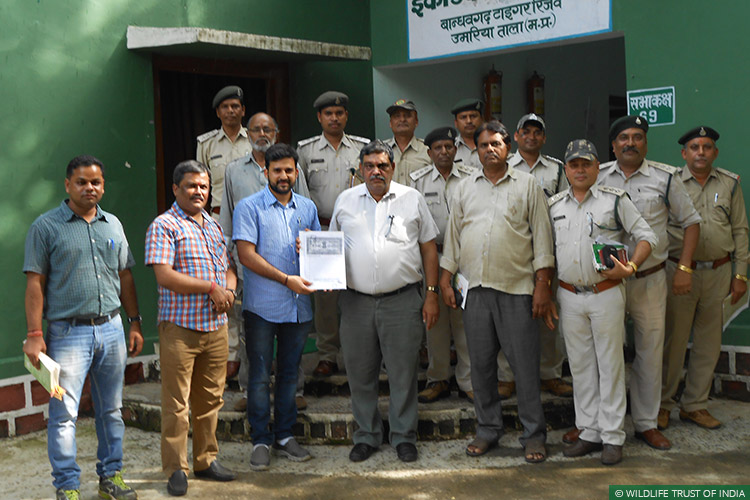
(left to right) L2: Advocate Yash Kumar Soni; L3: Advocate Abhimanyu Mann, WTI; L4: Mr Mridul Pathak, Field Director, Bandhavgarh Tiger Reserve; L5: Mr Shukla, SDO, Bandhavgarh Tiger Reserve
Bandhavgarh Tiger Reserve, Madhya Pradesh, August 27, 2017: As part of its multi-pronged approach to battling wildlife crime, Wildlife Trust of India (WTI) has been providing legal assistance to state forest departments across several Protected Areas in India since 2013.
Extended under the Litigation Project of WTI’s Wildlife Crime Control Division, this unique form of assistance involves regular consultative meetings between WTI attorneys specialising in wildlife law and forest department personnel involved in the investigation and prosecution of wildlife crime. It is based on the understanding that wildlife and forest-related offences are fundamentally distinct from other crimes and require a specialised focus. Forest department personnel in general lack the requisite skill and training in filing cases related to wildlife crime in a comprehensive and error-free manner. The resulting lacunas related to legal procedure and documentation contribute to the abysmally low conviction rate in wildlife crime cases nationwide. WTI’s legal assistance seeks to address this issue at its very root.
The central Indian state of Madhya Pradesh faces massive pressures on wildlife due to hunting and poaching by local communities, with possible ties to the multi-billion dollar illegal international trade in wildlife and its derivatives being investigated. A single case related to the poaching and trade of pangolins last year had led to the arrest of over 70 members of a gang of poachers, with some of the accused having links to individuals operating in the border areas of India.
Under the terms of the MoU, WTI will begin providing legal assistance to Bandhavgarh Tiger Reserve through consultative meetings to be held twice a month
WTI has been providing legal assistance to Pench and Kanha Tiger Reserves in the state for several years now, whether in the filing of new cases in a comprehensive manner or providing advice on cases from these areas pending in the trial courts. The aim is to take appropriate and speedy legal action against wildlife criminals as per the definitions and provisions of the Wild Life (Protection) Act, 1972, thereby raising the conviction rate (which currently languishes at around four percent in the state) and creating an effective deterrent to wildlife crime. WTI has provided legal assistance in more than 400 cases related to Kanha and Pench thus far.
A Memorandum of Understanding (MoU) signed between WTI and Bandhavgarh Tiger Reserve, Madhya Pradesh, on July 31, 2017 has expanded the canvas of WTI’s legal support in Central India. Under the terms of the MoU, WTI will begin providing legal assistance to the tiger reserve through consultative meetings held twice a month with a wildlife law expert, on cases registered under the Wild Life (Protection) Act, 1972.
In the days following the MoU signing, several meetings were held under the supervision of Mridul Pathak, Field Director, Bandhavgarh Tiger Reserve. These meetings were attended by officials and staff from the Tala, Maghdhi, Khitoli, Pathor, Panpatha, Kalwah, Dhamokhar and Manpur ranges. Mr Pathak directed all personnel to take advantage of the forthcoming consultative meetings, while Abhimanyu Mann, Assistant Manager and Lawyer, WTI, explained the intricacies of the legal assistance programme.
Updates on the consultative meetings and how they have helped Bandhavgarh Tiger Reserve battle wildlife crime will follow.